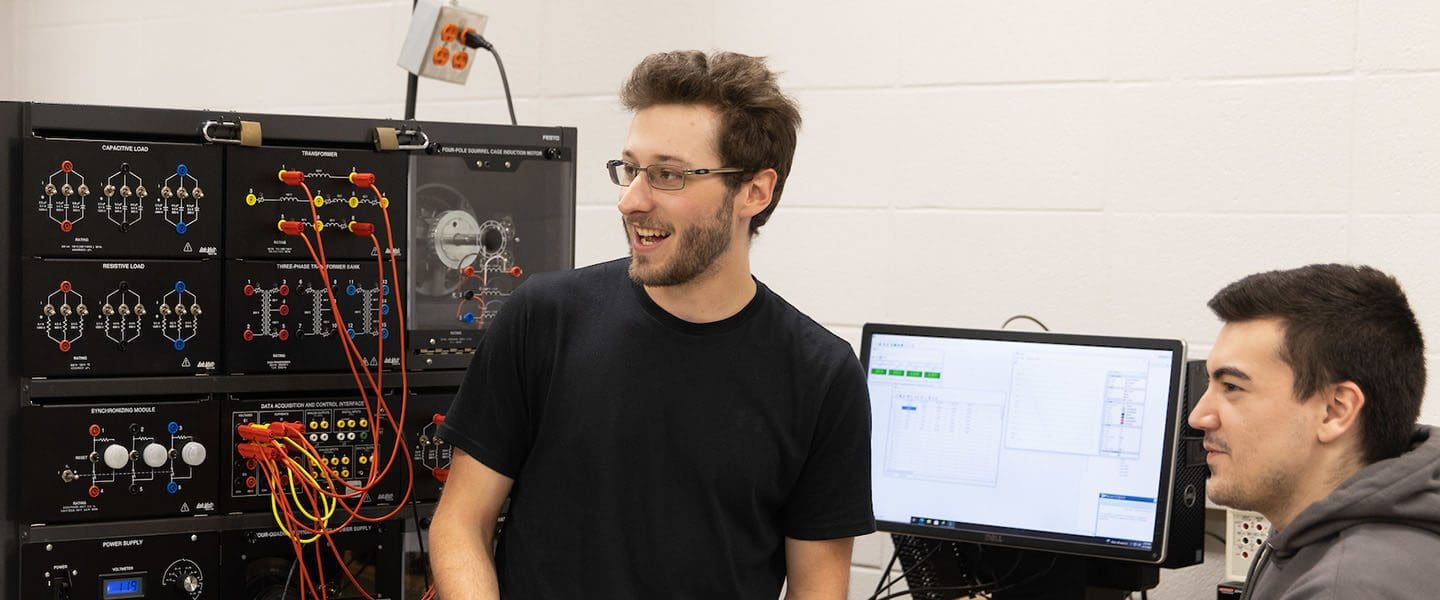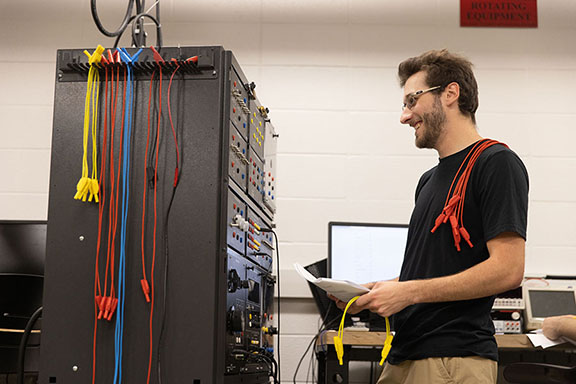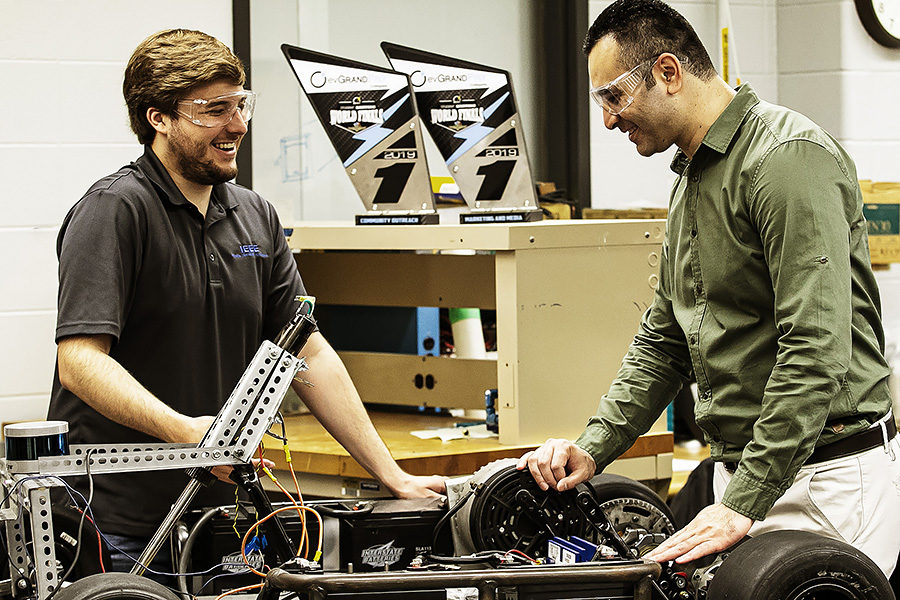
Bachelor's Degree in Electrical Engineering Technology
Bachelor of Science
Request Information
Electrical Engineering Technology Degree Program Overview
Purdue University Northwest’s electrical engineering technology degree program offers courses that are a blend of the application of engineering knowledge, scientific principles and technical skills used in modern industries. You will be prepared to design, develop and test electronic, electrical power and electric drive systems.
Our bachelor of science degree curriculum provides hands-on experience such as the design and development of electric transportation, robotics and IoT Systems for cloud-based applications.
Department of Engineering Technology
Our faculty have a wealth of real-world experience and are leaders in their respective disciplines.
You will be mentored by experienced instructors and train in real-life laboratories and settings, gaining a theoretical and hands-on understanding of what it takes to succeed in the electrical engineering technology industry.
Program Educational Objective One
The program will prepare graduates with the technical skills necessary for successful careers in the design, application, installation, manufacturing, testing, documentation, operation, maintenance, analysis, development, implementation, and oversight of electrical/electronic(s) and computer systems. The graduates are honed with the skill sets pertaining to data computation, analysis and problem solving.
Program Educational Objective Two
The program will prepare graduates to work as effective team members with commanding oral and written communication skills, as well as to advance in their careers and continue their professional development.
Program Educational Objective Three
The program will prepare graduates to exercise humanistic ethics in their profession and to recognize the global impacts of their profession on society. Upon graduation our graduates are industry ready.
Graduates of the Electrical Engineering Technology program will demonstrate (Student Outcomes):
- an ability to apply knowledge, techniques, skills and modern tools of mathematics, science, engineering, and technology to solve broadly-defined engineering problems appropriate to the discipline;
- an ability to design systems, components, or processes meeting specified needs for broadly-defined engineering problems appropriate to the discipline;
- an ability to apply written, oral, and graphical communication in broadly-defined technical and non-technical environments; and an ability to identify and use appropriate technical literature;
- an ability to conduct standard tests, measurements, and experiments and to analyze and interpret the results to improve processes; and
- an ability to function effectively as a member as well as a leader on technical teams.
Enrollment Trends and Graduation Data
| Year | Enrollment | Graduates |
|---|---|---|
| 2022-23 | 50 | 11 |
| 2021-22 | 57 | 21 |
| 2020-21 | 64 | 20 |
| 2019-20 | 75 | 23 |
| 2018-19 | 93 | 35 |
Electrical Engineering Technology Major Curriculum
You’ll take a balance of general education courses, College of Technology core courses and electrical engineering technology courses. Our program offers courses that emphasize practical aspects of engineering along with abstract concepts and theories.
Introductory courses courses blend engineering knowledge, scientific principles and technical skills used in modern industries.
Sample Courses
- ECET 10001 – Introduction To Electrical And Computer Engineering Technology
- ECET 15901 – Digital Circuits And Applications
A deeper knowledge is built by integrating theory with extensive hands-on laboratory training, mathematics and science.
Sample Courses
- ECET 20901 – Microcontroller Applications
- MA 16019 – Applied Calculus I For Technology
System knowledge deepens with opportunities to explore computer systems, electrical power and renewable energy, electric mobility, electronics hardware, process controls and telecommunications.
Sample Courses
- ECET 30301 – Telecommunication Systems
- ECET 39200 – Digital Signal Processing
The Senior Design Project provides the opportunity to pursue an idea from conception to design, then execute into a demonstrable project.
Sample Courses
- ECET 49000 – Senior Design Project Phase I
- ECET 45500 – Object Oriented System Design
Electrical Engineering Technology Degree Program Highlights
Students complete a Senior Design Project, a one-year capstone individual/team project that provides the opportunity to pursue an idea from conception to design, then execute into a demonstrable project.


Electrical Engineering Technology Degree Program Outcomes
The PNW Engineering Technology program prepares graduates for a variety of careers in embedded computer systems, electrical power and renewable energy, electronics, control, and telecommunications through classroom and extensive hands-on laboratory training.
Electrical Engineering Technology Degree Program Career Paths
- Computer Hardware/Software Engineering
- Industrial Process Control Instrumentation Engineering
- Power Electronics Engineering
- Telecommunication Engineering
- Electrical Power Engineering
Electrical Engineering Technology Degree Program Beyond the Classroom
You’ll have many opportunities to get involved in on- and off-campus activities, including:
Electrical Engineering Technology Degree Program Employers
- Cisco Systems, Inc
- NIPSCO
- Commonwealth Edison
- Sprint
- AT&T
Electrical Engineering Technology Degree Program Scholarships
In addition to the scholarships available to all PNW applicants, students seeking an electrical engineering technology degree may also apply for program-specific scholarship awards, such as:
- C. R. Hutton Endowed Scholarship
- Clare & Lucy Osterle Scholarship
- Kaiser Aluminum Scholarship
Electrical Engineering Technology Degree Program Accreditation
The Electrical Engineering Technology Bachelor of Science program is accredited by the Engineering Technology Accreditation Commission (ETAC) of ABET, https://www.abet.org, under the commission’s General Criteria and Program Criteria for Electrical/Electronic(s) Engineering Technology.

Earn a Bachelor's Degree in Electrical Engineering Technology at PNW
Purdue University Northwest’s electrical engineering technology prepares you for a career with skills in designing, developing and testing electronic systems, electrical power and electric drive systems.
To see how an electrical engineering technology degree from PNW opens doors, from corporate boardrooms to non-profit leadership, take the next step today!



